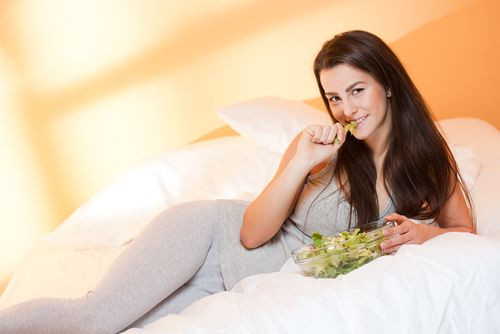Eat Right, Sleep Tight: 6 Surprising Sleep-Inducing Foods For A Good Night's Sleep

Getting a good night’s sleep is imperative to restore our bodies and minds. However, this is easier said than done, as many of us have trouble falling asleep. With more than 50 million Americans not getting the basal sleep of seven to eight hours every night, according to the Centers for Disease Control and Prevention, sleep deprivation makes us more likely to suffer from chronic diseases like heart disease, and cancer. Rather than relying on prescription sleeping pills that can become habit-forming, harmful if you have certain conditions, and contain weird side effects, it’s best to opt for natural sleeping aids to get some shut eye.
1. Bananas
This fruit is well-known for being rich in potassium, and is a good source of vitamin B6. This vitamin is essential for melatonin synthesis, or the production of the sleep hormone — melatonin — which helps regulate sleep, and wake cycles, according to the National Sleep Foundation (NSF). Kenny Kline, founder of Slumber Sage, a mattress company, told Medical Daily, “Bananas have a great deal of potassium, which acts as a muscle relaxant, preparing the body for sleep. Bananas also contain tryptophan, which turns into melatonin - the hormone that produces sleepiness.” Bananas are also carbs which can help make you sleepy as well.
2. Tart cherry juice
If you have trouble sleeping, and don’t like cherries, it may be time develop an acquired taste. “Cherries, especially tart cherries, are a unique dietary source of melatonin, a chemical that helps regulate sleep and our body's internal clock,” said Torey Jones Armul, a registered dietitian and spokesperson for the Academy of Nutrition and Dietetics, to Medical Daily. This makes it an ideal natural sleeping aid.
A 2010 study published in the Journal of Medicinal Food found when adults with chronic insomnia drank a cup of tart cherry juice twice a day, their insomnia severity was lessened. The NSF considers cherries, such as dried, frozen, and juice to be a better alternative for boosting the body’s won supply of serotonin compared to melatonin supplement pills.
3. Hummus
This popular spread most often serving as an accompaniment to crackers, pita, and vegetables, can help curb your appetite come night time to prevent waking up in the middle of the might hungry. Hummus contains L-tryptophan — an amino acid that makes you sleepy — and turns to 5-HTP, releasing relaxing serotonin, says Washington State University Alcohol & Drug Counseling, Assessment, & Prevention Services. Milk also contains-tryptophan, and is high in calcium, which helps promote sleep.
4. Lettuce
A side of lettuce with your dinner plate may help you fall asleep earlier and more effectively. Lettuce contains lactucarium, which contains sedative-like properties that can affect the brain the same way opium does, according to Oregon State University’s Wellness Ink April 2014 issue. Kale and spinach are good add-ons to your salad as they are loaded with calcium which helps the brain use tryptophan.
5. Pretzels
This staple ball park snack may help you sleep soundly at night. Pretzels are a source of carbs which can make you feel sleepy, but since they are low in calories, eating a handful of pretzels won’t pack on the pounds, give you stomach cramps. One ounce of pretzels contains 23 grams, or seven percent of our daily value, and two percent of our daily value of magnesium, according to the United States Department of Agriculture. Magnesium is a mineral needed for quality sleep, and prevents a magnesium deficiency which is known to make it harder to stay asleep.
6. Tuna
Eating tuna, or fish such as salmon and halibut before bed, can deliver a high amount of vitamin B6 which helps produce melatonin. Fish is high in tryptophan which is known to induce human sleepiness and/or sleep. A 1983 study published in the journal Sleep found L-tryptophan in doses of one gram or more, produces an increase in rated subjective sleepiness, and a decrease in sleep latency, or time to sleep. This amino acid, one of the nine essential ones, helps produce serotonin which is responsible for maintaining a proper sleep cycle.
Adding these natural sleep aids to your diet can help boost your melatonin levels, and help you get on your way to a good night’s sleep. They should be consumed about one to two hours before going to bed. Foods needs time to make its way through the digestive system to have their effect.



























